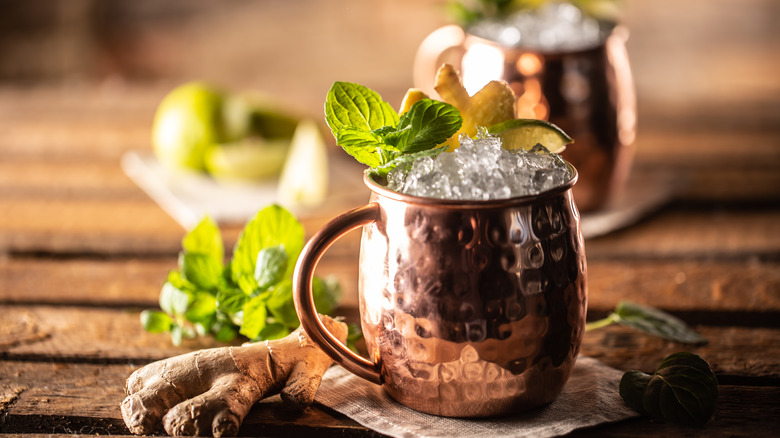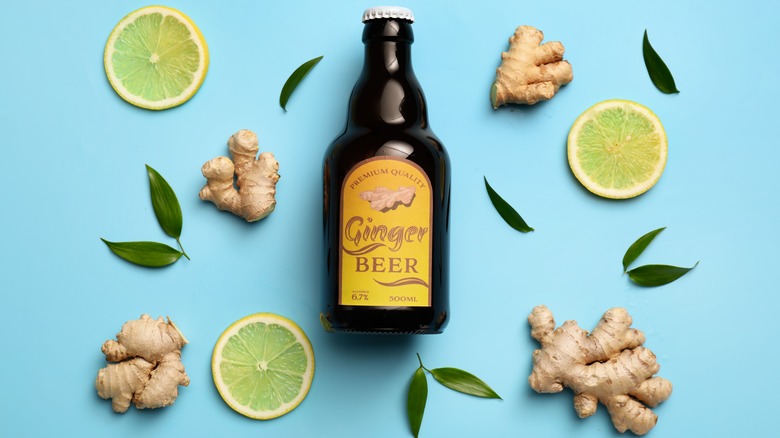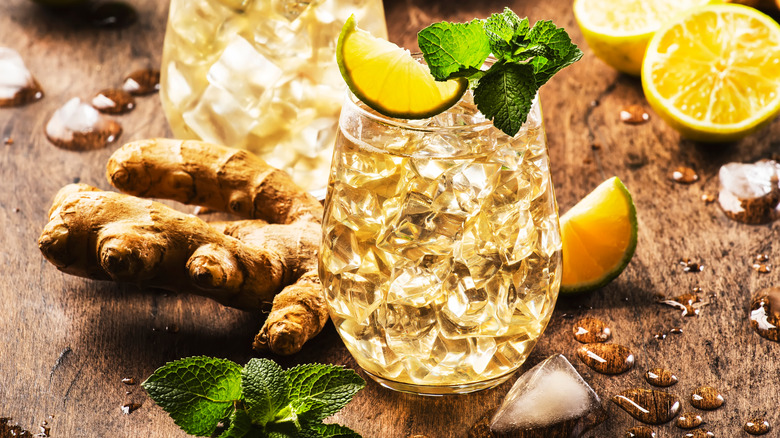The Brewing Difference Between Ginger Ale And Ginger Beer
If you're craving a fizzy, spicy drink, you might reach for a ginger beer or ginger ale, but how do you choose between the two? Besides the slight name variation, do you know what makes them distinct?
First, there are some flavor differences between these two bubbly, ginger-flavored soft drinks. While both ginger ale and ginger beer can be enjoyed alone or mixed into cocktails or mocktails, ginger beer has a spicier flavor and tends to look darker colored and a little cloudy. People often prefer ginger beer in cocktails like Mules, Dark and Stormies, or any other boozy drink that requires a stronger ginger flavor. Ginger ale, on the other hand, tends to be lighter colored and has a milder flavor, making it a slightly spicier alternative to club soda or other basic mixers.
Ginger beer's more intense ginger flavor and darker color sometimes lead people to believe it's just a fancier or more concentrated ginger ale, but that's not the case. The two drinks are actually made using different methods: ginger beer is brewed, ginger ale is not. And it's this production detail that makes all the difference.
Traditional ginger beer is brewed like beer or kombucha
Ginger beer is traditionally a brewed or fermented beverage, and is made from a mix of ginger and sugar combined with yeast or a symbiotic culture of bacteria and yeast (SCOBY).
Because of this brewing process, ginger beer actually contains a very small amount of alcohol. According to the Texas Historical Commission, early ginger beer contained around 11% alcohol by volume (ABV), though these days, most ginger beer contains very little alcohol, around 0.5% ABV or less, similar to most kombucha. Per FDA standards, beverages with 0.5% or less alcohol are considered non-alcoholic since this is considered a trace amount and a byproduct of the fermenting process. This label applies to other "non-alcoholic" fermented beverages, including non-alcoholic beer or wine.
Modern commercially made ginger beer involves a short fermentation cycle to limit the alcohol at trace levels so it can legally be sold as a soft drink. Home-brewed ginger beer may contain more alcohol since it is harder to manage the process precisely at home. Some brands, like Sprecher's Griffin Ginger Beer, are made without fermenting yeast or SCOBY to avoid traces of residual alcohol.
This brewing method is the reason ginger beer tends to have a cloudy appearance compared to ginger ale and also usually tastes spicier. As such, people who love ginger may enjoy ginger beer over the more subtle flavor of ginger ale.
Modern ginger ale is a carbonated soft drink
At times, ginger ale is used simply as another name for ginger beer, but most often, it describes a completely different product, one that's made without being brewed. In fact, ginger ale can be made at home by mixing together just three ingredients, no fermenting required. This makes ginger ale a good choice for someone who wants a soft drink completely free of alcohol, despite having the word "ale" in its name.
The core ingredients of ginger ale are carbonated water, ginger flavor, and sugar, though some makers also add ingredients like lemon juice or spices. Ginger ale usually gets its flavor from ginger extract, rather than from ginger root, allowing the maker to control the level of dilution. This results in a lighter ginger taste, lighter color, and sweeter beverage.
The ginger ale we see most often today dates back to the 1900s when Canadian pharmacist John McLaughlin popularized a lighter, milder flavored ginger ale than what was on the market at the time. McLaughlin marketed his pale ginger ale, known as Canada Dry ginger ale today, as the "Champagne of ginger ales." Pale ginger ale gained popularity during U.S. prohibition, took over the market, and remains a popular soft drink and the prevailing style of ginger ale sold today.
Now that you understand the difference between traditional ginger beer and ginger ale, it's easier to know which one may be a better fit for your next drink. If you want a more intense, spicy ginger flavor, ginger beer may be your go-to. If your drink calls for something light, sweet, and effervescent, or you're concerned about consuming any alcohol content at all, then ginger ale might be the best option.


